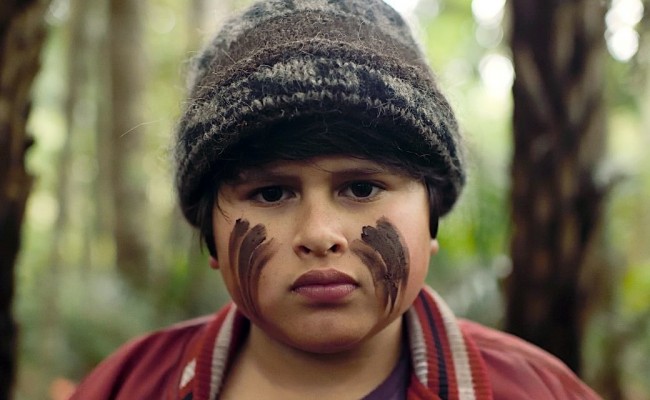I appear this evening as a thief and a robber.
I stole this head, these limbs, this body from my master, and ran off with them.– Frederick Douglass
Humour humbles us and takes us out to the dance. It makes itself useful by functioning as a tool of unconscious analysis that can suspend internal bias, and offer alternative methods of tackling sticky subjects. Director Taiki Waititi knows this. His recent film, Hunt for the Wilderpeople (HFTW), delicately deploys humour to pick at the foundations of the judicial system of New Zealand, where the film is set. Through the experiences of young Māori boy Ricky Baker, and his relationship with his begrudging foster father (or ‘uncle’) Hec, the film examines the impact of the judicial system on the country’s children, particularly Māori youth, and the history of colonisation that continues to perpetuate disconnection and trauma in Te Ao Māori (the Māori world).
Despite the strong sociopolitical undercurrents, the film is not dragged down by didacticism. Waititi is so brilliant at biting satire that the film is funny, heartwarming and doesn’t leave the viewer feeling cynical or hopeless.
Initial impressions may border on associations with kitschy, indie movies like Where the Wild Things Are, HFTW hints at something more structural and political – but an understanding of New Zealand’s colonial history, the oppression of Māori and the pervasive inequalities that linger on to this day would prove beneficial to anyone watching the film, and watch it you must.
HFTW’s real-world political critiques occur in small moments throughout the film, but are perhaps most apparent in scenes like the short monologue where Ricky tells Hec why he doesn’t want to go back into foster care: ‘there’s no more homes – just juvy. They don’t care about kids like me, they just moving us around until kids like Amber …’ Amber was Ricky’s best friend who, it is implied, died due to abuse and neglect.
It’s important to consider the relationship between Māori and the prison system, which is institutionally colonial: this system was created to incarcerate Māori who resisted British occupation. In New Zealand, as in many other countries, the primary victims of the prison–industrial complex are Indigenous; indeed, the criminal justice system upholds white supremacy by criminalising and disproportionately arresting, charging and incarcerating Māori. Any examination of the carceral, therefore, must always start with an examination of the legacy and institutionalisation of colonialism. (Note, we use carceral here instead of prison, or ‘criminal justice’. Prison is too specific, whereas carceral describes the broader criminal justice system’ of which prison is a part. It speaks to the idea that the function of prisons is not just located within prison walls but that the punitive mentality that creates prisons is pervasive in wider society.
The treatment of Ricky that Hunt for the Wilderpeople depicts – as a hooligan, a repeat offender, an animal, a threat or danger that must be caught and restrained – is evidence of the ingrained racism that targets young Māori men especially. Despite the claims of Paula (the social worker tasked with ‘hunting’ Ricky down) that ‘no child should be left behind’, her treatment of Ricky does not stem from care and/or a sense of responsibility as much as it shows an exercise of state power and containment. Indeed, Paula’s repetitive refrain echoes the harmful mantra of the Bush administration’s education policies, which standardised learning and exacerbated the ‘school-to-prison’ pipeline. The pipeline is a phenomena in New Zealand as well.
Then there is the way Paula talks about Ricky; for instance, ‘He’s not just a child, he’s a spanner in the works’ – a reflection of the existing colonial mentality in New Zealand, where Māori children are treated as older and less innocent than their Pākehā counterparts. As Angie Han argues, Ricky and Hec ‘are not people so much as problems to be solved.’
Throughout the film Waititi juxtaposes the ‘natural’ and the ’artificial’/institutional/constructed, which can also be called the carceral. Compare the quiet opening scenes of a lone car making its way through lush terrain to the exaggerated chase that comes later. The ridiculousness of army tanks and various militia being deployed against Ricky are, in many ways, slapstick and absurd. Yet it clearly illustrates the us versus them mentality so evident in state power. The wilderness where Ricky and Hec initially retreat to, on the other hand, disarms them, offering protection, healing and guidance.
As it turns out, Ricky and Hec are both victims of the punitive criminal (in)justice system, which claims to bring order, but that is something the protagonists instead find in the bush. The film reveals how the ‘justice’ systems may have the appearance of order and safety from chaos, but actually enacts violence and separation. The continued shifting and removing of Ricky from family to family is evidence of this, in stark contrast to when he encounters a Māori family in his travels and they offer him warmth, acceptance and solidarity. Ricky, clearly traumatised by an uncaring alienating carceral system finds solace in the company of other outsiders, far from the city. This is significant: urbanisation was a violent process for Māori, severing many traditional cultural and social formations. It is not a coincidence that the movie is set deep in the country: the bush is a space where Ricky and Hec are able to reconnect, and find whānau (family), love and redemption.
Critics have called HFTW a ‘mini-masterpiece’ and it’s the expertly travelled paths between these different themes that make it so, and despite exploring the experience of colonialism and the carceral in New Zealand, the film has universal themes. The success of the film in Australia and the US (both settler-colonial states with racialised prison-industrial complexes) makes sense.
Hunt for the Wilderpeople could have been a despairing film, but Waititi’s careful treatment and delivery instead offer alternative ways of seeing. It shows how connection can heal ingrained pain and trauma. The movie is even more admirable when we realise Ricky’s character goes beyond being just an avatar for grief and marginalisation: his salvation represents a quiet dream for a just future.






